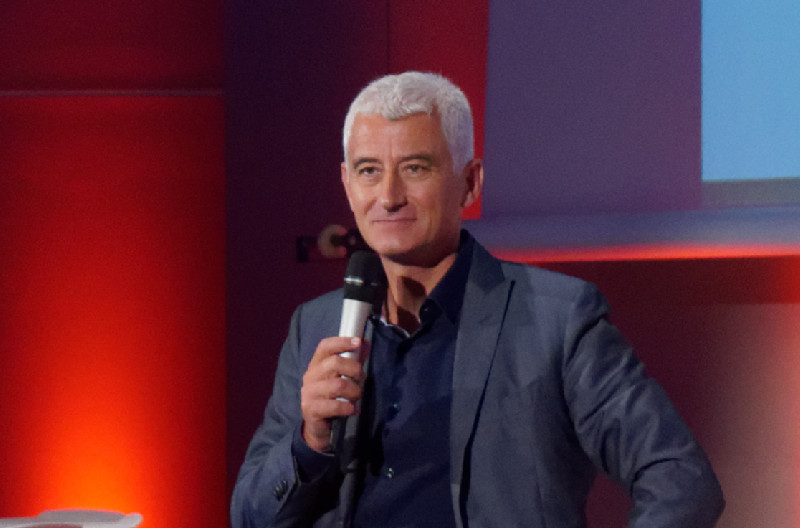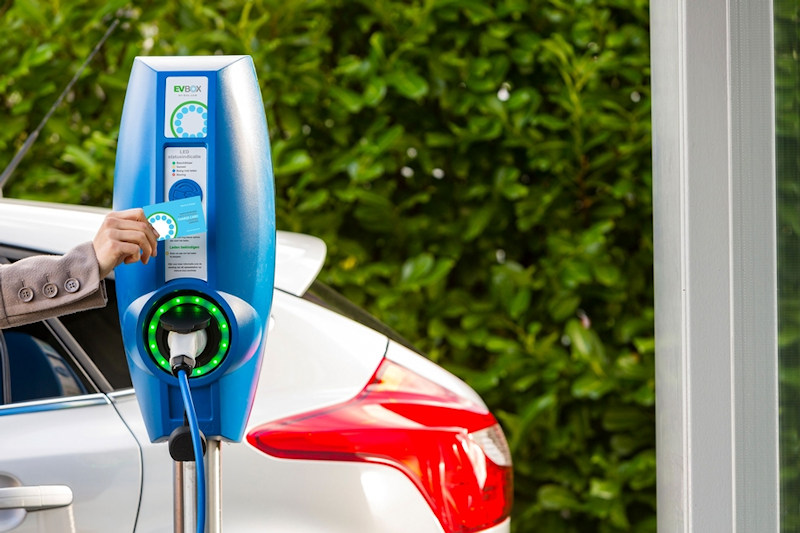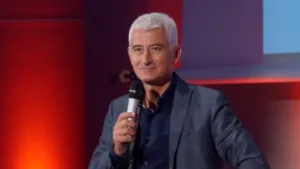The next speaker was Thierry Lepercq of Engie which is a very old company – more than 200 years and in 70 countries and supplying 2% of the electricity in the world. Facing the strongest challenge in 200 years. Lepercq said that the industry is heading for a ‘complete blackout’ (he got the audience to close its eyes – then said “that’s the future”!). Solar and renewables are coming, very, very quickly, he said.
Go to Hawaii,Leperca said, where solar power is very important and is killing the system. Solar is said to be so much cheaper. It’s not just in obvious countries, in Chile, for example, there is 3000MW of solar and wind capacity, without the industry being financially supported by the stat, but the marginal cost of energy has gone to zero. That poses real threats to the energy economy.
 Thierry Lepercq of Engie. Image:Meko
Thierry Lepercq of Engie. Image:Meko
Recently in Santa Clara there have been problems caused by big spikes in power demand from car re-charging. Amsterdam is already a haven of electric cars – Lepercq said that 50% of taxis are electric today and by next year this will be 100% – and that will have a big impact on the electricity supply. There are solutions being worked on including decentralised batteries to deal with fluctuating supply and demand and he said that big batteries are 80% cheaper than five years ago. Home-based batteries are a big potential market and also interesting is the development of “energy communities” such as Sonnen communities that have been set up in Germany to trade energy. There is also work going on to develop a system for those that want to to go ‘off grid’. It’s not so bad if you can be locally provided with energy.
Engie acquired EV-Box which is developing a network of car charging points (ChargePoint is also big in the US) and Lepercq said that an important part of running a charging network is collecting data as well as providing power. Batteries and hydrogen are good for storing energy, but it’s not enough at the moment. Engie is involved in a big project to model renewable energy penetration.
 Engie has bought EV Box but is worried about the spikes in electricity demand to charge cars.
Engie has bought EV Box but is worried about the spikes in electricity demand to charge cars.
The power industry has been built on big rotating machines – generators etc are pretty well all turbines – and that means that there is a lot of inertia in the system . It’s a kind of miracle to be able to adjust to frequency and voltage so finely, yet with typical adjustments done on a 30 minute control cycle. If you take away the rotating systems systems become de-centralised and de-carbonised, but difficult to control.
If inertia goes away (or reduces), it gets really hard to manage the system and you get black outs. If inertia goes away, you’re not working on a 30 minute cycle to balance, but in real time, in microseconds, Lepercq said. IoT is nice to have in industry, he said, but there needs to be a huge amount of control and monitoring to control the balance of power demand. The system will be complex and need AI and a lot of data processing to make it all work.
Authorities are “Off the Pace”
The bad news is that few regulators have thought of this. If you ask utilities in the US, they are not thinking about it at all, but China is thinking about it and is working on an “Internet of Energy”, which will make it possible to balance the system. Energy today is based on assets – plants and transmission systems. However, in the future, it will be controlled by a platform, ‘an Android’ – the question is, who will run it and control it?
There is an immense challenge and at the event Lepercq made a call to the CEA to respond to this challenge. He said that there are already very big players. Envision Energy has 10% of all the wind power capacity in the world and is a Chinese firm. However, the firm has 100 people already doing research at Stanford and has major executives in the US. Energy is not going away – solar is now cheap – the question is, “how do you make it safe and guaranteed?”. This will not need national answers, but will be internationally developed.
Analyst Comment
This talk was not really ‘on topic’ for our display readers, but it seems to me that this is a big topic that is bound to have an effect. For example, after the nuclear meltdown in Fukushima, TVs with battery back-up became important as cooperative Japanese citizens reduced their power consumption in a collaborative way to reduce peak loads and avoid power cuts. They had originally been developed for regions of the world where power availability is not reliable. Even in our developed part of the world, power cuts are not unknown, and I guess that one issue is that the current power system is not a very robust design – there is. effectively, a single point of failure.
I have seen large domestic batteries being promoted at IFA and companies such as Panasonic have the idea that every home should have a big domestic battery to deal with power variability. That is probably more efficient than making sure that all appliances have their own back-up plan, but I can imagine how this could become more important over time.
At IFA in 2016, Euronics said that it thought that big domestic batteries are a large potential market. The one they were promoting at the time was the Houze Zerocell. Panasonic also said at CES that it saw a big opportunity in that market.
The Economist has run some very good articles on the impact of solar on the economics of conventional power generation. It seems that we are going to need some real re-alignment in business models if we are to have a range of different energy solutions. (BR)

